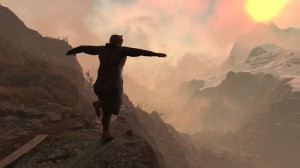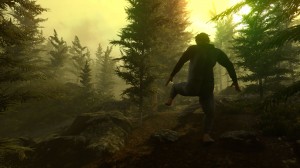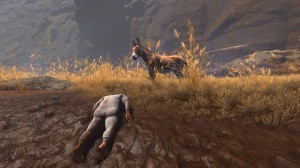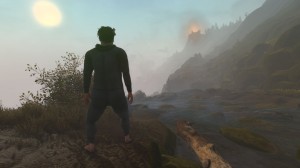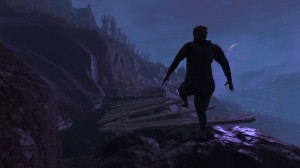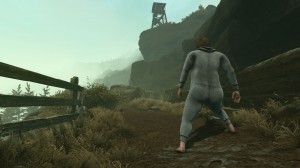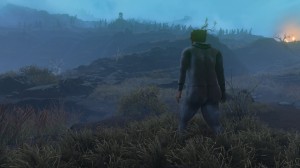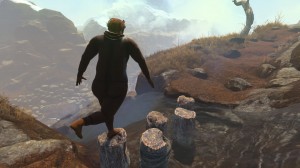Baby Steps
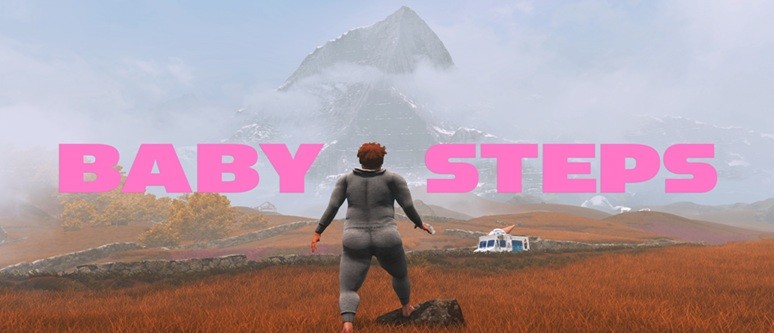
by Jordan Helsley
reviewed on PC
First Steps
Much like Bennett Foddy's QWOP and Getting Over It, Baby Steps is, at its core, a game about locomotion and overcoming adversity. As the name implies, this time it's about putting one foot in front of the other and moving with forward momentum. For Nate, our 35-year-old inept man-child taken from his filthy bedroom in his parents' basement into a strange world, it's about that, and so much more. This man, barefoot and wearing onesie pyjamas, sets out for the top of the mountain, and only the limits of the player's resolve to overcome the physics-based challenge can stop him.
The first action the game asks the player to perform is to walk forward with the left stick. It then hands out the first of many failures as Nate faceplants onto the ground. With a pull of either trigger, the corresponding foot needs to be raised, positioned, and set down. And while Nate has incredible balance on one or either foot, his weight distribution is in the player's hands, and the challenge of the game becomes clear. Working through the landscape will inevitably lead to many moments of frustration. Uneven steps become tight spires with toe-width ledges become snow-covered rocks. The mechanic of placing each foot is incredibly precise (and once you get used to the camera that becomes an incredible tool), but just as you begin to feel confident the landscape throws another variable your way. In some instances it's a low overhang, requiring you to watch your head or body as well, in others it's tight spaces where the act of rotating your knee clear of an obstacle is the challenge. Each piece of landscape is a mini challenge with varying levels of consequence, but occasionally the exceedingly difficult obstacles show themselves early, and can stop you in your tracks for a moment of horror, excitement, and mental preparation. Like falling to a particularly difficult boss, a tumble down a mountain means little more than tedium to return to that challenge once more, but, if the act of walking is the source of joy, that tedium becomes meditative.
Wanderlust
The world of Baby Steps is large, mostly open, and extremely enigmatic. Just about everywhere you go there's some curiosity barely visible in the distance, a clear landmark inviting you to explore, or small remnants of life such as cans or bottles on the sides of paths. The design cleverly blends handmade paths with just enough randomness to feel like a real mountain. It rewards exploration with little curiosities, side quests, cut scenes, or just some sort of visual splendor. Other clever bits of design make the world feel paradoxically large and small at the same time, while mostly maintaining that "up" is the direction you need to go if you're ever lost.
Even in the inevitable moments of feeling lost, the simple act of walking always leads to something new eventually. And because many obstacles have multiple routes of varying difficulty, the variety of each person's playthrough easily becomes a point of comparison to share among friends. There's just so much little, and missable, stuff scattered throughout the world, and that’s outside of the curated difficult obstacles that make you feel monumental when you overcome them.
Stumbling Along
It feels weird for a game about wandering, but a blemish on the trail of Baby Steps is one of pacing. There are at least two moments during the ascent up the mountain that feel somewhat final, yet the trek continues. One sequence in particular offers tough puzzle climbs as entirely optional set pieces beside an extremely easy path to the next checkpoint. It reminded me of the end sequence of Toejam & Earl, an easy trek taking in the sights, only it came before the halfway point.
Fleshing out the experience a little more are signs asking for help retrieving lost items, resulting in a little bit of investigative work on the part of the player. These little handheld items, once found, become another point of danger during a large fall, which can dislodge the item from Nate's grip. Occasionally these items will end up stuck on an impossible to reach ledge or clipping between rocks, resulting in an unfortunate and unintended consequence of the physics. These moments feel more frustrating because they're unfair, and there's no telling where and when it might happen.
Walking and Learning
Nate's story throughout this difficult journey is relatable at face value, and stuffed with additional metaphors, but it can be another pain point when combined with the act of walking. Nate is meant to be hated, and even the opening moments are a tremendous success in that effort. Likewise, the first couple of characters he meets along the way are different degrees of insufferable. The humour in these interactions is meant to disarm these situations, as subjective as that is. Most of that humor comes from Nate's dry, awkward demeanor and ridiculous tendency to deny all help presented to him: he turns down shoes, a map, and a lantern for a dark cave. These refusals are funny, but they also highlight how the game refuses to hold your hand throughout the journey. It worked for me, and even drove me up that mountain.
As the story goes on, it feels like there's a tangible, if subtle, change from the opening hours' potty humour to something that more closely relates to Bojack Horseman, complete with anthropomorphized animals. This is in part because they dive deeper into very real conversations about Nate and his mental state. I was not prepared for the ways that I would relate to Nate's story and journey, but it ended up being one of the best parts of the experience.
Just Keep Walking
In one potential interaction late in the game has Nate confronting a cocky NPC, Jim, about his choice between two paths. Jim mentions that the hard path is only for the best climbers, and that Nate should take the easy one. Halfway up the easy path, Nate remarks to Jim that he chose it because it's meditative. The thing about this moment, and Baby Steps overall, is that it reveals itself as just that: meditative. The game isn't going to tangibly reward you for the hard path, that's for your own validation, but it likewise won't punish you for the easy one. The journey is the point. The majority of that journey features nothing but the sound of Nate's feet slapping the ground, with occasional "oh no" vocalizations as he loses his balance. If you would consider a cacophony of animal sounds as background music, then there is occasional background music, but even that is rare. It's you and Nate alone on this journey (between cutscenes) with plenty of time to be meditative, introspective, and challenged.
Baby Steps succeeds at everything it tries to do, and does so with very few blemishes. Foddy, Cuzzillo, and Boch were able to expand upon previous games like QWOP by bringing the subtext forward, creating an intriguing world, and giving us a flawed character that is more relatable the further into his journey you get. It's not easy, but the rules are made clear, so tackling and overcoming these challenges results in pure joy from beginning to end. It may end up being a footnote in the "walking simulator" and "puzzle platformer" genres, but I'll never think about walking the same way again.
As always, follow Hooked Gamers on Instagram for news updates, reviews, competitions and more.
9.0
fun score
Pros
Challenging and satisfying gameplay that excels in precise simplicity. An engaging world littered with intrigue and a small variety of characters that feed into a deeply relatable story.
Cons
A few frustrating instances of geometry trapping quest items and a few moments of awkward pacing.
